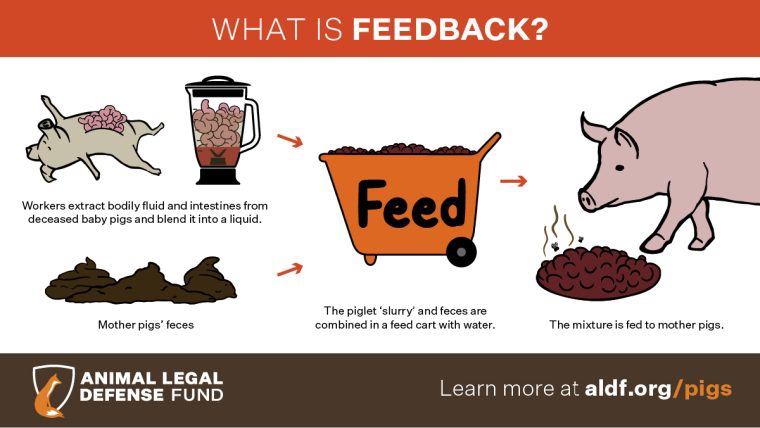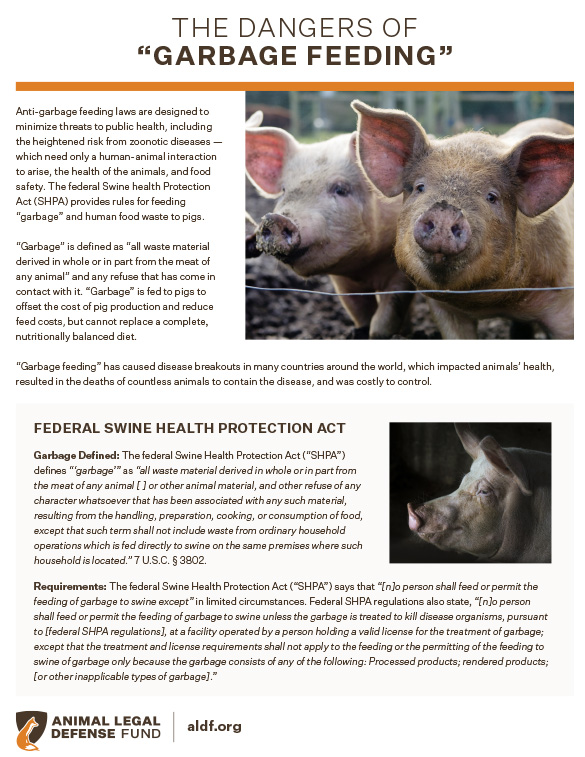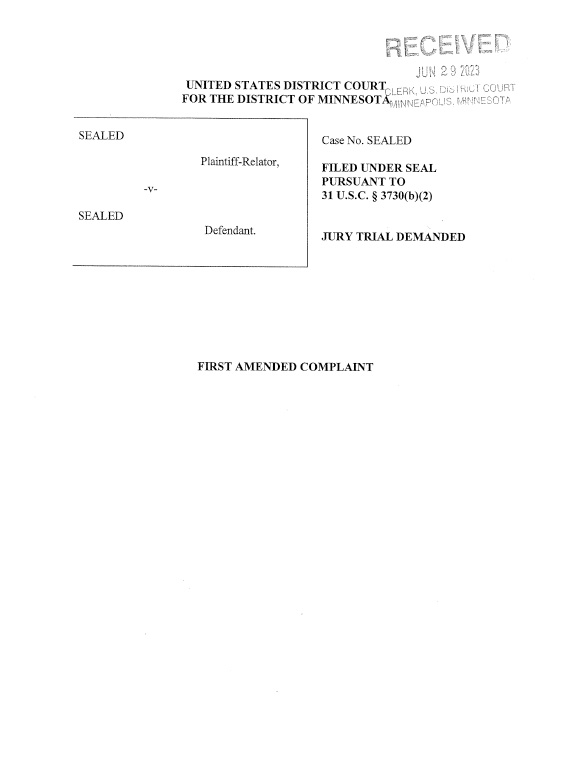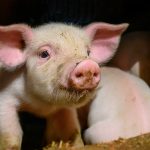
Challenging Holden Farms Cruelty and Garbage Feeding Via False Claims Lawsuit
Animal Legal Defense Fund v. Holden Farms
Lawsuit alleges violations of the federal Swine Health Protection Act, Minnesota Anti-Garbage feeding law, and Minnesota Anti-Cruelty Law.
Next Step
Holden Farms to answer complaint
In September 2021, the Animal Legal Defense Fund filed a False Claims Act lawsuit against Holden Farms that has been under seal while the Department of Justice (DOJ) reviewed the case.
An undercover investigation conducted by Animal Outlook of a Holden Farms pig breeding facility in Utica, Minnesota exposed employees alleged criminal conduct, including feeding dead piglet intestines and bodily fluids blended into a ‘slurry’ with pig feces to mother pigs — a practice the animal agriculture industry calls “feedback.” The employees “did so without heating and testing this ‘feedback mixture’ as required by law.” This violates both federal and state anti-garbage feeding laws.
The undercover investigation took place between November 2019 — March 2020.
The false claim is predicated on Holden Farms’ receipt, and the ultimate forgiveness, of $2.57 million in Paycheck Protection Program (PPP) loan funding under the CARES Act. To secure this funding, Holden Farms certified it was not engaging in any illegal activity under federal, state, or local laws. The lawsuit claims the four-month undercover investigation at the Utica facility establishes Holden Farms “engages in systematic and ongoing violations of the Federal Swine Health Protection Act, the Minnesota anti-cruelty law, and the Minnesota anti-garbage feeding law.”
Alleged violations of federal and state laws:
- The continuous neglect the animals suffered resulted in catastrophic injury — including untreated prolapses with organs spilling out from pigs’ vaginas.
- Dead animals pile up by the dozens, their bodies left to rot and mummify in pens and hallways.
- Holden Farms employees savagely beating its mother pigs, manhandling piglets in “jokes” with coworkers, improperly and cruelly castrating male piglets, and cruelly botching euthanasia of both mother pigs and piglets.
- Holden Farms fed “garbage” — in the form of a smoothie-like mixture of pig feces and dead piglet body parts — to mother pigs.
- Holden Farms repeatedly and knowingly deprived — and continues to deprive — its pigs of food.
WARNING: Images are graphic. Unblurred images are available here.

A worker kneels on top of a sow

A piglet struggling to breathe after a failed attempt at euthanasia with carbon dioxide

A sow with a large tear in her ear

A sow locked inside a farrowing crate

A piglet suffering from a large sore

A worker castrates a piglet and prepares to throw the testicles at another worker

A cart full of dead piglets

A sow with a severe prolapse walks down a hallway

A worker cuts the tail off of a screaming piglet

A dead sow with a severe prolapse

A worker prepares to blend a dead piglet's intestines with feces to feed back to the pigs
“Based on the size of Holden Farms and the sheer volume of animals they produce, it’s not a concern that animals born in this facility could be anywhere… they are everywhere.”
– Daniel Waltz, Animal Legal Defense Fund Managing Attorney
Demand Congress hold factory farms accountable for abusing animals
The industrywide animal cruelty routinely occurring in U.S. facilities, such as Holden Farms, is unacceptable. Sign our petition today!
What court is the lawsuit filed in: U.S. District Court for the District of Minnesota
Animal Outlook, the organization that conducted the investigation, did provide the video footage and a full report to local law enforcement and requested they take action against Holden Farms. Animal Outlook followed up with local law enforcement multiple times and never received a response.
The False Claims Act allows the U.S. government to hold any person who knowingly submits, or causes to submit, false claims (provided inaccurate information) to the government liable for three times the government’s damaged, plus an additional penalty linked to inflation. In addition to the U.S. government, the False Claims Act allows private citizens to pursue perpetrators of fraud against the government and file lawsuits on behalf of the government (called “qui tam” suits). Many investigations and lawsuits related to defrauding the government arise from such qui tam actions.
How this relates to the lawsuit against Holden Farms:
To qualify for the Paycheck Protection Program, Holden Farms was required to affirmatively assert in government documentation that their business was not breaking any local, state, or federal laws. The Animal Legal Defense Fund is arguing the undercover video footage obtained by Animal Outlook demonstrates violations of the federal Swine Health Protection Act, the Minnesota Anti-Garbage Feeding Law, and Minnesota’s anti-cruelty law. If Holden Farms had truthfully responded to the question, they would not have qualified for the Paycheck Protection Program and would not have had their $2.57 million loan forgiven.
Learn more about the False Claims Act on the U.S. Department of Justice website.
When a private party (relator) files a qui tam lawsuit under the False Claims Act, they are required to file it “under seal.”
When filing a lawsuit under seal, the defendant (the party accused of fraud) is not served with the complaint at the time of filing. Instead, the complaint and a “written disclosure of substantially all materials evidence and information” is served to the Attorney General and the United States Attorney (USA). The government reviews the case to decide whether they will intervene in the litigation.
The seal exists to provide the government time to investigate the alleged fraud, determine if a government agency is already investigating the incident of alleged fraud, and decide if it will intervene in the lawsuit before the target is aware of the allegation.
By statue, a False Claims Act filing is only under seal for the first 60 days — but sometimes 60 days is insufficient. The government, “for good cause shown,” can ask for the seal to be extended. Extensions are not granted automatically, and proof of a serious inquiry and legitimate need for additional time are required for extensions. Cases can remain under seal for months or even years while the government investigates. During this time, relators must exercise a high level of discretion to maintain the integrity and provide for the best chance of success for the case.
If the government does not intervene, it is the relator’s to litigate.
How this relates to the lawsuit against Holden Farms:
The Animal Legal Defense Fund’s lawsuit against Holden Farms was filed on September 17, 2021, and has remained under seal at the request of the government until July 2023.
Garbage feeding is the act of feeding food waste to farmed animals. Most garbage feeding laws related primarily to pigs and their aim is to prevent zoonotic disease and devastating illnesses that can kill entire populations of animals on farms due to their extreme confinement.
The definition of “garbage” varies in the federal Swine Health Protection Act and state anti-garbage feeding laws — but all include meat and regulating or prohibiting how animals can be fed to other animals.
How this relates to the lawsuit against Holden Farms:
In the undercover footage captured by Animal Outlook, on multiple occasions, Holden Farms employees take deceased piglets, cut open their abdomens, and empty bodily fluids and their intestines into a blender. The blender’s contents is later mixed with feces from the mother pigs and water, and fed to the mother pigs.
At no time were the piglets or their parts heated to 212 degrees Fahrenheit for 30 minutes to kill bacteria or viruses, as required by Minnesota law. Further, Holden Farms does not possess a license to feed its pigs garbage, as is required by the Minnesota Anti-garbage Feeding Law.
“Feedback” (also referred to as “natural planned exposure”) is a term used by the animal agriculture industry to represent the process of feeding a substance from one batch of farrowing pigs (pigs who have recently given birth and are nursing) back to the next group of pigs scheduled to give birth. It is most commonly referring to collecting diarrhea off the floor with paper towels from ill or deceased piglets or from the farrowing mother pigs. The samples would be ground up and added to the group of expecting mother pigs’ food.

How this relates to the lawsuit against Holden Farms:
In the undercover footage captured by Animal Outlook, on multiple occasions, Holden Farms employees take deceased piglets, cut open their abdomens, and empty bodily fluids and their intestines into a blender. The blender’s contents are later mixed with feces from the mother pigs and water and fed to the mother pigs on camera.
At no time were the piglets or their parts heated to 212 degrees Fahrenheit for 30 minutes to kill bacteria or viruses. Further, Holden Farms does not possess a license to feed its pigs garbage, as is required by the Minnesota Anti-garbage Feeding Law.

The Dangers of “Garbage Feeding” factsheet
Anti-garbage feeding laws are designed to minimize threats to public health. Learn how federal and state laws regulate the practice.

Lawsuit filed in U.S. District Court for the District of Minnesota
The United States of America ex rel. Animal Legal Defense Fund v. Holden Farms, Inc.
Why this case is important:
Factory farms are an immense risk for spreading zoonotic disease based on the large number of animals kept in such confined, concentrated spaces — but compounding that risk with this “feedback” practice during a global pandemic was unconscionable. The appalling abuse documented during the undercover investigation is illegal, and because Holden Farms made a false claim to the federal government to receive funding, it provided the Animal Legal Defense Fund standing to file a lawsuit against the farm. The Animal Legal Defense Fund is committed to using the power of the legal system to protect farmed animals from cruelty and ensure that the laws put in place to protect them are properly enforced.
Demand Congress hold factory farms accountable for abusing animals
The industrywide animal cruelty routinely occurring in U.S. facilities, such as Holden Farms, is unacceptable. Sign our petition today!

